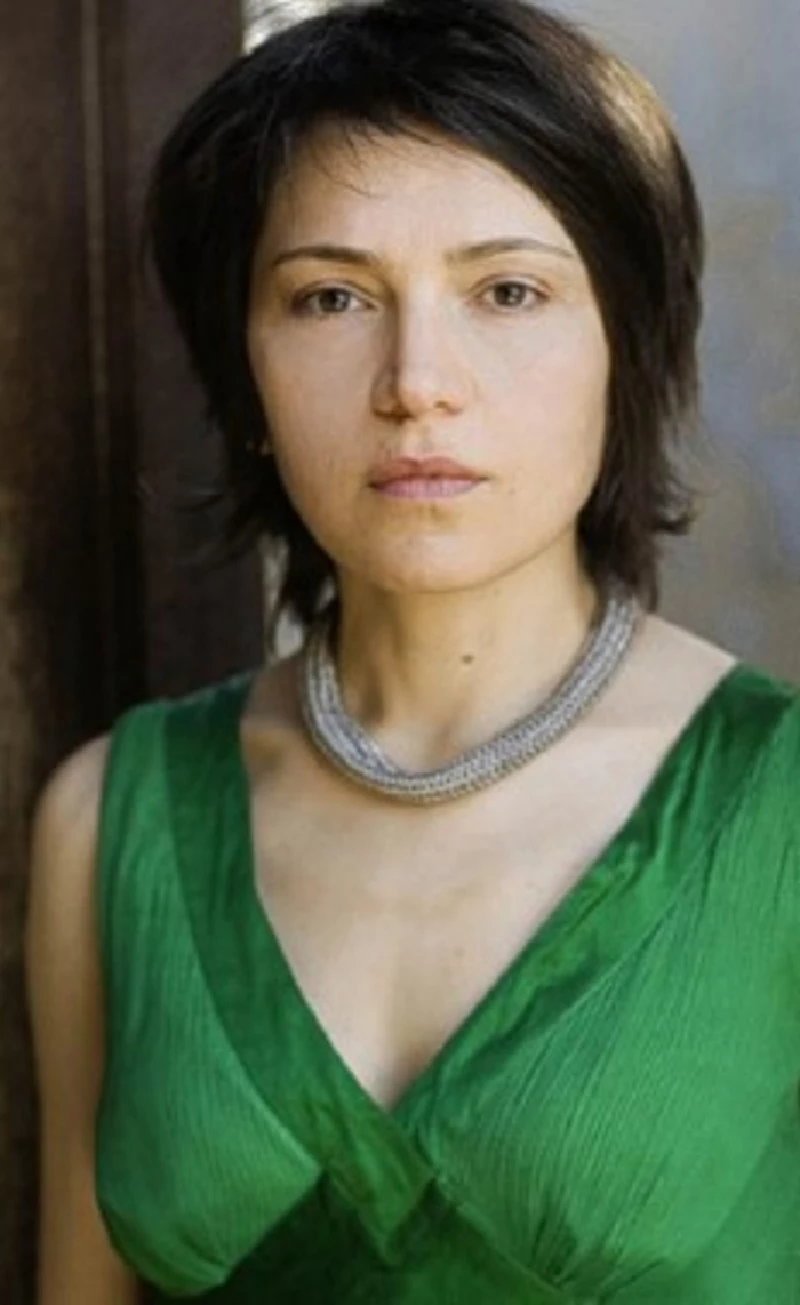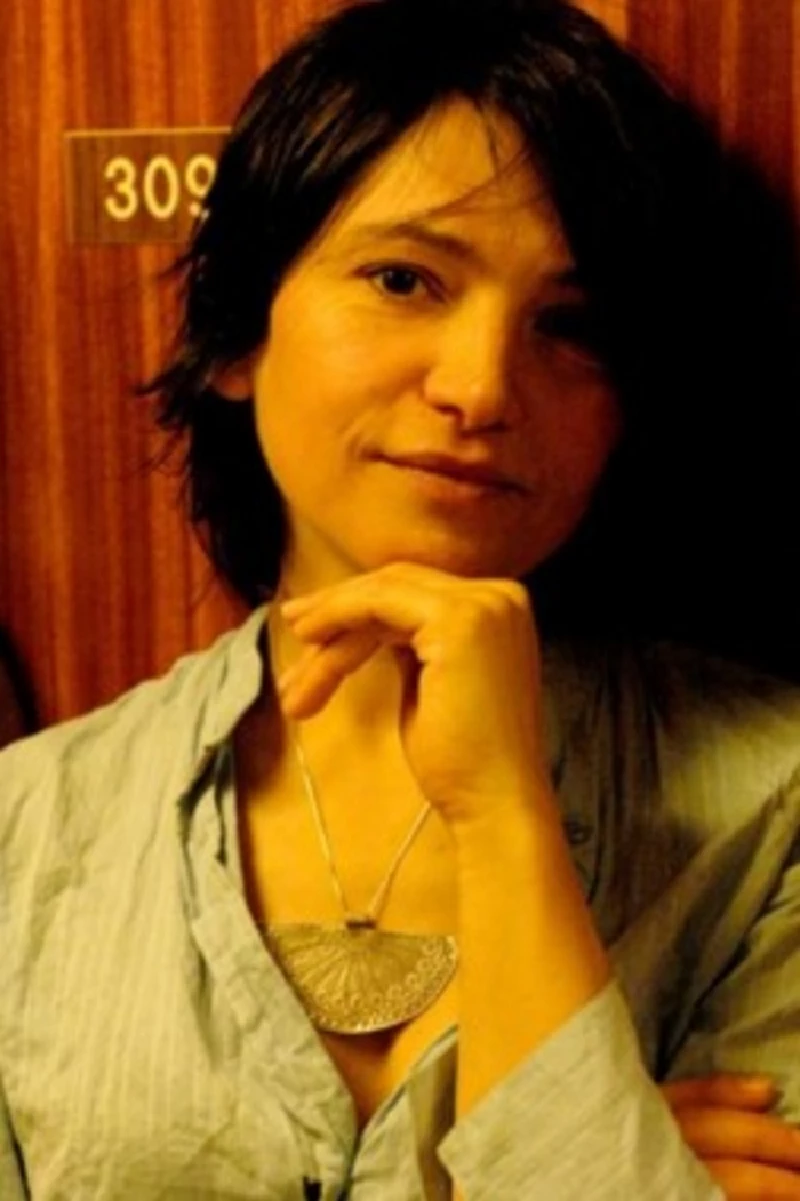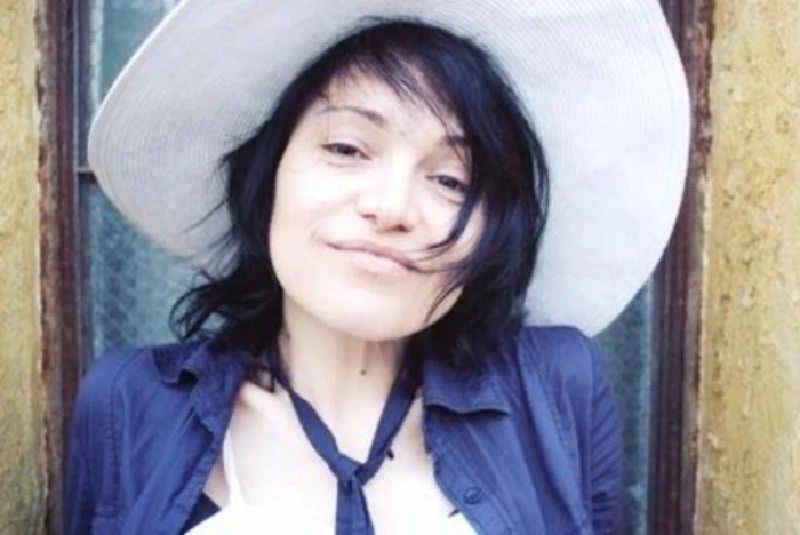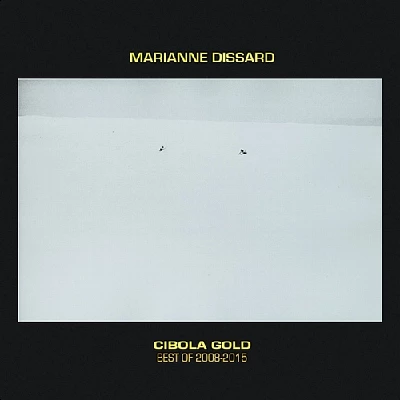Marianne Dissard - Interview
by John Clarkson
published: 25 / 6 / 2010

intro
John Clarkson speaks to French-born and now Tucson-based singer-songwriter Marianne Dissard about her debut album, 'L'Entredeux', which was produced and co-written with Calexico's Joey Burns, and 'L'Abandon', her forthcoming second album
Marianne Dissard’s first recording appearance was a guest singer on ‘Ballad of Cable Hogue’, one of the tracks on Tucson-based Americana outfit Calexico’s 2000 third album, ‘Hot Rail’. Singing her in native French, Dissard played the role of a femme fatale, the vixenish Madam, and, duetting with Calexico’s lovestruck front man Joey Burns who sung in English, honey trapped him into his doom. Before ‘Ballad of Cable Hogue', Dissard, who was born in the South of France but who has lived on and off in Arizona since she was sixteen, had worked as a filmmaker, a multimedia performance artist and also as a lyricist. As a filmmaker, she had directed various films for French TV and also made in 1996 ‘Drunken Bees’, a documentary about Howe Gelb’s Tucson rock group Giant Sand, which at that time featured in its line-up Joey Burns and his band mate in Calexico, drummer John Convertino. Dissard appeared as a performance artist in her own shows in both France and Tucson, while as a lyricist she wrote songs for Gelb, Francoiz Breuz and her then husband, French guitarist Gabriel “Naim” Amor. Dissard also duetted with Amor on 2001’s ‘Tete A Tete’, a one-off album by ABBC, a Tucson band which featured as well as Amor another French musician Thomas Belhom and once again Burns and Convertino. She made other fleeting appearances on various other Tucson-based projects and albums, before Burns, who had by now become a close friend, persuaded her to record her debut album, ‘L’Entredeux', for which he provided the music and Dissard both the vocals and lyrics. ‘L’Entredeux’, a collection of entirely French-sung ballads and waltzes, which was released in America and the rest of Europe in 2008, came out finally in the United Kingdom on new label Vacilando ’68 Recordings in June. Marianne Dissard is currently working on her second album, ‘L’Abandon’, with Italian composer Christian Ravaglioli. In conversation with Pennyblackmusic, she spoke about boh ‘L’Entredeux’ and ‘L’Abandon’ and the slow path that led her to becoming a singer and musician. PB : You first came to attention as a singer with your guest appearance on Calexico's ‘Ballad of Cable Hogue’. Had you had any experience as a vocalist before then? MD: Absolutely none at all. I was not even dreaming of or thinking that I should be or would be a vocalist. I was writing lyrics in French by that time, but that was all. PB: And having done ‘Ballad of Cable Hogue’ how quickly after that did you decide that you wanted to be a singer? Was it instantly? MD: No (Laughs). No, it wasn’t instantly at all. I was very content being a lyricist at the time and writing work for other people to sing. I was terrified at first of being on stage, but over the years after that first song that I did with Joey Burns I found myself wanting to be on stage more and more. Any time Joey was doing a show, if I was in the same town as him, I would ask him, “Can I come on? Do you want me? ” I never really allowed myself to think though that it could be a possibility that I could be a singer. It was so far removed from who I was. I was very content being in the background. PB: Did you help to write the lyrics and the parts in French for ‘Ballad of Cable Hogue’? MD: No. It was Joey. I helped him with some of the translation, but it was all his. PB: When did you actually first start writing lyrics? MD: 1995, when I met my then husband Naim Amor. He was living in France and I was living in Tucson at the time and that was before the internet and everyone had cell phones and before we had money to even have a land line. When we kept in touch at the beginning of the relationship, we would exchange what would become the lyrics to his albums. I had been writing poems since I was a teenager, but those switched to becoming lyrics when they fell into the hands of a guitar player and a songwriter. PB: Was there a pivotal point then when having made guest appearances on various albums that you decided to become a singer-songwriter? MD: Yeah, I think it was when Joey asked me to do an album with him. Before that point it had never really dawned on me that I could do that. When someone like that tells you that they want to do an album with you and thinks that you have got something that could turn out well, you have just got to go with it (Laughs). You have got to trust that person. I would have never dreamt of doing it otherwise though (Laughs). I remember the first time that I had to sing out loud, to use the words that I had written and wanted to sing it really struck me then that there was no going back. It was a really scary feeling. PB: Was that the beginning of ‘L’ Entredeux’ when he told you that he wanted to do this album with you? MD: Yeah, it was. I would sit down and write day after day until I had enough songs. I cranked out the lyrics and then literally chucked them at his doorstep. It was hard. PB: You’ve lived in America since you were sixteen and are bilingual. Do you tend to think in English or French? MD: It shifts. Until about three years ago and when I was still living with Naim Amor, both of us being French, I would speak and think in French more than English, even living in Tucson, but now that has really switched. I don’t use French much anymore, although I still write in it. The new album, ‘L’Abandon’, has got songs in French, English, Spanish and Italian on it. PB: Did you make a conscious decision to write and sing in French on ‘L’Entredeux’ or did you just do what came to you naturally? MD: It came naturally. I didn’t think, “Oh, I should write an English album or a French album.” A lot of that had to do with the subject matter and the things which I wanted to explore on it which were really personal. In some respects I think that it was a way of hiding. PB: ‘L’ Entredeux’ was recorded at a difficult time in your life. You had just separated from your husband and were living in a friend’s spare bedroom in Tucson. Many of those you around you would have had little or no French and not known exactly what you were singing about. Was that then why you wrote and sung in French? MD: That was exactly what happened I think. If I think of writing in French, I write for myself I suppose more than anybody else. The songs I tend to write in English are a lot snappier and more sound-based. That is not to say that you can’t make interesting sounds in French (Laughs), but at the time I felt only able to commit to matters of the heart in French. English felt like more of a practical day to day language. That has changed actually. It was true with the first album, but is not necessarily with the new one. PB: ‘L’Entredeux’ translates as “being between two periods.” Why did you choose that title? Was that because of what was going on with your personal life and also the fact that you have one foot in both America and France? MD: Yeah, it is to do with that. It was about being between two allegiances in several respects I suppose. I like titles which can encompass quite a few thoughts. ‘L’Abandon’, is also like that. PB: The meaning of ‘L’Abandon’ in English is “the desertion” or “the abandonment”. Why did you decide to call it that? MD: To be technical about it, the actual breaking up with my husband was only two years ago. It was going on while we were doing the first album and it really only got finalised two years ago. That was when I started writing new songs for this coming album. That title ‘L’Abandon’ has, however, also got more of a sexual overtone to it, that idea of losing all abandon in the act of love or sex. In a very poetic way that is also one of the themes on the new album. The songs on it kind of straddle both ends of the spectrum. PB: With ‘L’Entredeux’ you didn’t provide the music, but brought all the lyrics to it, didn’t you? MD: That’s how it happened. I brought Joey the lyrics and he came up with the melodies and the chords and hooks and also produced it. There were three songs on that album which were written by Naim Amor, so there were nine songs by Joey and three with Naim. The way I wrote the lyrics for that album was with an A part, B part, chorus, verse. The rhythmic was also very tight. If one verse went one way then the second verse had to have the same metre and so on. With each lyric I would bring in a song by someone that I loved or that I really liked and would use that to inform the tune and give it a direction. One, for example, might be a little more poppy. Another one might be a little more dramatic. That was my way of communicating with Joey and directing him. Once the songs had their initial shape, however, it was all done by Joey. PB: Did you write the songs with Naim in a different way? MD; Two of them were done in the same way with me writing the lyrics and Naim writing the music. One of them was done in reverse in which the music was written first and involved a more organic, collaborating process. I can conform to doing it either way with the lyrics or the music first. It doesn’t really matter to me. PB: Did you bring in the three songs that you had written with Naim into the studio for Joey to work on after that? MD: Naim played the guitar on them and then Joey added things like bass and cello. PB: ‘L’Entredeux’ has been out in America and Europe since 2008. Why has it taken so long given the interest in Calexico for there to be a British release? MD: I wish that I had put out the album and everyone had picked up on it at once, but it didn’t work like that. There were complicated issues between my European label and original British label, cultural clashes, that kind of thing, and the deal fell through. Vacilando '68 who are putting it out in Britain are, however, very enthusiastic. Shaun Hendry, who runs it, is a huge fan of Calexico and the whole Tucson scene actually. He has come out to Tucsonv quite a few times. It is a labour of love and I can totally relate to that. PB: For ‘L’Abandon’ you have been song writing with the Italian composer Christian Ravagliolo. Has the song writing on this new record worked in a different way to that on ‘L’Entre Deux’? MD: Yes, it has been very different. I am always in the room with Christian when we are writing which I wasn’t always with Joey. I might give him a general idea, or maybe he might have something already, a little melody or something. He then comes up with the piece on the piano with me there as he is creating it. It can be an arduous, pretty painstaking process. Christian doesn’t really write pop songs and what he does involves intricate chord changes and structures that are pretty dense. I have words and themes that I have collected over the years in notebooks and booklets. I will keep listening to him and something will impose itself from them, and then from that the process of fitting words to melodies will start to happen and I’ll develop and expand on what I have already come up with. It is a lot more difficult a way of working, but in a way is a treat to do work like that because you are not tied, you are not slave to something that you wrote. You have to jump through a lot of hoops to get there though. We will also involve a band on it. PB: You are also apparently planning a remix version of ‘L’Abandon’. Will that be released at the same time as the full-length album? MD: I am not sure. I am not sure what is going to happen with that and whether we are still going to be doing that. We are definitely going to be working on a companion film to the album though. It’s a wacky remake of ‘Lonesome Cowboys’, a Western film by Andy Warhol that was shot in Tucson in 1968. PB: Which in itself is a Western satire. Why have you decided to do that? MD: A lot of the themes in the film by Andy Warhol have a lot to do with the subject matter of the album. It is about a bunch of cowboys, a band of brothers, and this woman in the desert. The film itself is almost unwatchable, but some of the bits in it are very funny. Its subject matter includes gender and love and desert verses urban living. What we are going to be doing is taking the core of that script and injecting my songs in there in various ways. It could be a cowboy singing a song or it could be music from a car stereo. I’ll be directing it and it is probably going to last about an hour. PB: Do you see yourself as a full-time musician these days or also still as a filmmaker? MD: A full-time musician who uses everything at her hand and in her box of tools. Now that I am a more confident about being a musician everything has kind of naturally evolved and I have found myself integrating a lot of what I have done in the past, whether it be performance art or film making. PB: What tone do you see the new album taking? Is it going to be an upbeat album or a melancholic album? MD: It has got some really dark and heavy songs, but there are also some really funny and upbeat songs. It is all over the place really (Laughs). PB: When is ‘L’Abandon’ coming out? Is it going to be this year or next year? MD: It will be early next year. PB: Thank you.
Band Links:-
https://www.facebook.com/mariannedissardhttp://www.mariannedissard.com/
https://twitter.com/mariannedissard
Picture Gallery:-


soundcloud
reviews |
|
Cibola Gold : Best Of 2008-2015 (2016) |

|
| Excellent compilation of thirteen tracks drawn her five albums from 2008 to 2015 for French chanteuse Marianne Dissard |
| The Cat Not Me (2014) |
most viewed articles
current edition
Carl Ewens - David Bowie 1964 to 1982 On Track: Every Album, Every SongArmory Show - Interview with Richard Jobson
John McKay - Interview
Colin Blunstone - Thalia Hall, Chicago, 16/7/2025
Billie Eilish - O2 Arena, London, 10/7/2025
Bathers - Photoscapes 1
Visor Fest - Valencia, Spain, 26/9/2025...27/9/2025
Loft - Interview
Sir Tim Rice - Interview
Robert Forster - Interview
previous editions
Manic Street Preachers - (Gig of a Lifetime) Millennium Stadium, Cardiff, December 1999Heavenly - P.U.N.K. Girl EP
Beautiful South - Ten Songs That Made Me Love...
Peter Perrett - In Dreams Begin Responsibilities Interview Part One
Oasis - Oasis, Earl's Court, London, 1995
Boomtown Rats - Ten Songs That Made Me Love....
Coldplay - Wembley Arena. London, 16/8/2022
Prolapse - Interview
Trudie Myerscough-Harris - Interview
Pixies - Ten Songs That Made Me Love...
most viewed reviews
current edition
Davey Woodward - Mumbo in the JumboSick Man of Europe - The Sick Man of Europe
Lucy Spraggan - Other Sides of the Moon
Suzanne Vega - Flying With Angels
Amy Macdonald - Is This What You've Been Waiting For?
Phew, Erika Kobayashi,, Dieter Moebius - Radium Girls
Bush - I Beat Loneliness
Alice Cooper - The Revenge of Alice Cooper
Blueboy - 2
Cynthia Erivo - I Forgive You
Pennyblackmusic Regular Contributors
Adrian Janes
Amanda J. Window
Andrew Twambley
Anthony Dhanendran
Benjamin Howarth
Cila Warncke
Daniel Cressey
Darren Aston
Dastardly
Dave Goodwin
Denzil Watson
Dominic B. Simpson
Eoghan Lyng
Fiona Hutchings
Harry Sherriff
Helen Tipping
Jamie Rowland
John Clarkson
Julie Cruickshank
Kimberly Bright
Lisa Torem
Maarten Schiethart